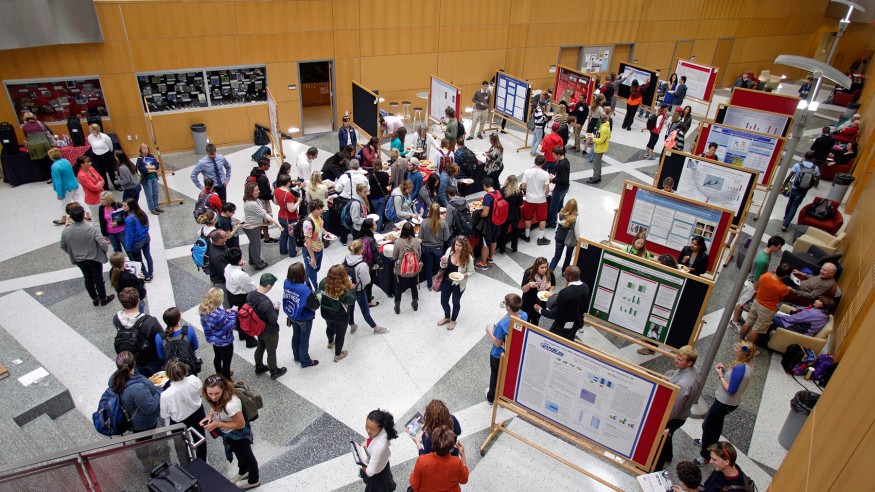
Summer Science Research Symposium
Ohio Wesleyan’s annual Patricia Belt Conrades Summer Science Research Symposium provides a venue for students to present the research they conducted with faculty mentors. Students sometimes present their work at professional conferences and collaborate with professors to publish their findings in scientific journals. (Photo by Paul Vernon)
Ohio Wesleyan University hosted its annual Patricia Belt Conrades Summer Science Research Symposium on September 15, allowing students to present and share work completed over the summer. Research fields ranged from biochemistry to botany with students working in small groups or by themselves, all while under the guidance of faculty mentors.
After guests walked around the atrium of Schimmel/Conrades Science Center and spoke with project presenters, President Rock Jones welcomed everyone to the symposium, including prospective students attending a “Consider Science” event.
He discussed the commitment and dedication demonstrated by the students who worked for 10 weeks over the summer to explore their designated research fields, and he offered special appreciation for the faculty members who worked alongside the students and provided guidance.
Jones also noted that OWU has a unique and great history in the sciences. He said Merrick Hall, originally built in 1873, was “one of only a few buildings dedicated solely to the sciences in the entire U.S. in a time when most universities did not have campus buildings reserved for a single subject matter.”
This year’s symposium featured 25 poster presentations, and visitors were able to take in a wide range of experiments and research results. Many of the studies were the first steps in what the researchers consider a multi-faceted discovery.
One such research compilation was presented by seniors Thin Nu Yee, Kaitlyn Kropf, and Katie Swindler. Working under the mentorship of psychology professor Lynda Hall, the three explored the perception of aging and memory performance in older adults within the United States and in Myanmar.
Kropf and Swindler examined the aging process and memory performance throughout Ohio, while Lee traveled home to Myanmar and proceeded to collect data there. Lee explained the original hypothesis was that Myanmar senior citizens would have a better overall aging experience because of the greater level of respect given to the elderly there.
However, their joint research revealed that people who experienced a more positive aging experience were more likely to have worse memory performance. They explained that different education levels must be taken into account and may prove to be more important on memory performance than the actual aging experience itself. These results will help dictate future scientific exploration for the students.
Assistant professor of psychology Jennifer Yates described the benefits of acting as a mentor for the students: “My favorite part of the Summer Science Research Program is getting to be with my students when they have the ‘a-ha’ moment … when they realize that they are scientists themselves. It is the small-group atmosphere that really allows the conversion of the ‘mentor-student’ relationship into a relationship among colleagues.”
Senior Ryan Stefancik shared a similar sentiment in his research with associate professor of zoology Dave Markwardt: “The work is extremely difficult, and there were a lot of road bumps. But the results were all the more rewarding for that.”
Together, Markwardt and Stefancik examined the polyamine-dependent control of mRNA stability in Schizosaccharmoyces Pombe. Their research can be applied to more advanced cancer research down the road.
Read more about the research and findings of this year’s symposium participants in the abstracts booklet.
Photos from the Patricia Belt Conrades Summer Science Research Symposium
